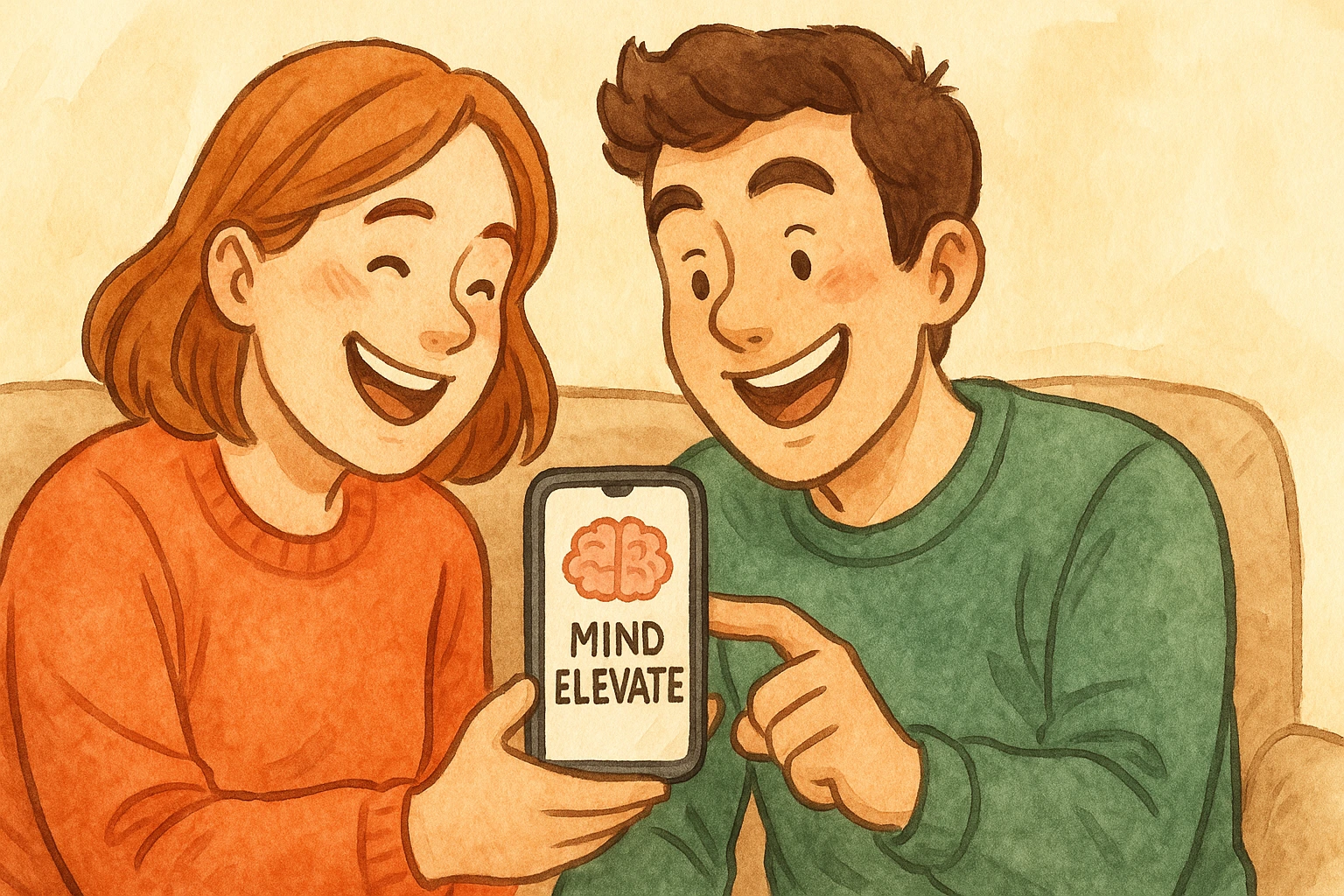.Your brain is your greatest asset. Whether you're tackling work deadlines, managing family life, or just trying to remember where you parked your car, mental agility is the secret sauce that makes everything smoother. Boosting your brain power daily isn’t just for students or professionals—it’s essential for anyone who wants to stay sharp, emotionally balanced, and ahead of life’s curveballs.
So how do you actually train your brain beyond the clichés of "read more" or "solve a puzzle"? Below, we break down the most powerful daily strategies and free brain games grounded in science and designed to make your brain more adaptable, focused, and resilient—without burning out.

1. Challenge Your Mind With Targeted Activities
Cognitive strength grows with use. Just like your muscles need resistance training, your brain thrives on challenge. Whether it’s switching to a new language app, playing memory-based card games, or experimenting with strategy board games, every novel mental task pushes your neural pathways to form new connections.
Why it works:
Harvard Health emphasizes that engaging in learning-based tasks stimulates neuroplasticity—the brain’s ability to reorganize and adapt over time. That means your brain can literally grow stronger with practice, no matter your age.
Examples of daily brain challenges:
Activity | Benefit |
Sudoku or Crosswords | Enhances logical reasoning and memory |
Learning a new recipe | Combines memory, sequencing, and focus |
Brain-training apps | Targeted improvement in weak areas |
Reading nonfiction | Builds knowledge and verbal processing |
2. Prioritize Daily Physical Exercise
Surprisingly, one of the most powerful brain boosters isn't found in a puzzle book—it's in your shoes. Physical exercise increases blood flow to the brain, which delivers more oxygen and nutrients to keep your neurons firing on all cylinders.
Neuroscientist-approved benefits include:
Enhanced mood and reduced stress (hello, dopamine!)
Boosted hippocampus activity, improving memory and learning
Lower risk of neurodegenerative diseases like Alzheimer’s
What counts as brain-boosting movement?
You don’t need a gym membership to get started. Here’s what works:
Exercise Type | Duration | Brain Benefit |
Brisk walking | 30 mins | Improves memory and focus |
Cycling or swimming | 30–45 mins | Enhances mood and processing speed |
Yoga or Pilates | 20 mins | Reduces stress, increases clarity |
Just remember—consistency trumps intensity. Daily movement is the key.
3. Eat for Cognitive Fitness
You truly are what you eat, and your brain is especially picky. A well-nourished brain runs smoother, thinks quicker, and holds on to information longer.
The Mediterranean diet is frequently cited in medical literature as the gold standard for brain health. Rich in antioxidants, omega-3s, and anti-inflammatory compounds, it helps protect against cognitive decline while fueling concentration and memory.
Brain-friendly foods to put on your plate:
Food Group | Examples | Brain Benefit |
Leafy Greens | Spinach, kale, arugula | Rich in folate and vitamin K |
Omega-3 Fats | Salmon, flaxseeds, walnuts | Supports memory and reduces inflammation |
Berries | Blueberries, strawberries | Packed with antioxidants |
Whole Grains | Oats, quinoa, brown rice | Provides steady energy to the brain |
Stay hydrated too—your brain is 75% water.
4. Ensure Quality Sleep
You can’t think your way through poor sleep. While you rest, your brain is hard at work consolidating memories, clearing toxins, and preparing for a fresh day of focus.
Most adults need 7–9 hours of sleep per night, ideally with minimal light and a consistent bedtime. Poor sleep isn’t just about fatigue—it’s linked to memory lapses, poor concentration, and even long-term cognitive decline.
Quick Sleep Optimization Tips:
Shut down screens at least 30 minutes before bed
Keep your bedroom dark and cool
Stick to a routine—even on weekends
If you’re tossing and turning regularly, consider mindfulness or gentle stretching before bed to ease the transition.
5. Strengthen Social Connections
Yes, catching up with a friend or chatting with a neighbor is brain training—really. Research shows that social interaction is tied to better memory, improved resilience, and even reduced risk of dementia.
Why it matters:
Human conversation activates multiple brain areas simultaneously—language processing, emotional regulation, memory recall, and executive function. Socializing isn’t just fun; it’s a neurological workout.
Smart ways to stay socially active:
Activity Type | Description |
Weekly meet-ups | Join a book club, walking group, or class |
Video calls | Stay in touch with distant family/friends |
Group activities | Board games, collaborative art, or music |
Volunteering | Creates purpose and mental engagement |
Loneliness is more than an emotion—it’s a risk factor for cognitive decline. Nurturing real connections is one of the most protective things you can do for your mind.
6. Practice Mindfulness and Stress Management
A racing mind, chronic worry, and constant distraction drain your mental battery. Mindfulness techniques like meditation, breathwork, or guided visualization help regulate the nervous system and retrain your brain to focus better under pressure.
How mindfulness improves cognition:
Reduces cortisol (the stress hormone) that interferes with memory and learning
Strengthens the prefrontal cortex (responsible for decision-making and concentration)
Enhances emotional control and attention span
Try this simple daily routine:
Time of Day | Activity | Duration |
Morning | 3-minute body scan meditation | 3 min |
Midday | Box breathing (4-4-4-4) | 5 min |
Evening | Journaling or gratitude list | 10 min |
Even short sessions have cumulative benefits. Apps like Insight Timer or Headspace can guide beginners through easy daily practices.
7. Keep Learning and Try New Skills
Learning isn’t reserved for school or formal education—it’s a lifelong cognitive fertilizer. When you acquire a new skill, your brain has to build new neural circuits. The more diverse and complex the task, the greater the brain gain.
Top skill-building ideas:
Take an online course in coding, art, or psychology
Pick up a musical instrument or foreign language
Learn chess, sewing, or photography
Start a DIY project or build something from scratch
The goal is not perfection—but novelty. Trying unfamiliar activities keeps the brain agile and improves overall cognitive flexibility.
8. Train Your Brain With Proven Digital Tools: Mind Elevate
If brain training feels like a chore, it's time to gamify it. Mind Elevate is a science-backed app that turns mental workouts into engaging mini-games—all while targeting key cognitive skills.

Why Mind Elevate stands out:
Unlike generic puzzle apps, Mind Elevate uses cognitive science and adaptive difficulty to create a brain training journey tailored to your profile.
How It Works
Feature | Description |
Personalized Brain Assessment | Onboarding test reveals strengths, weaknesses, and personal cognitive goals |
Diverse Training Categories | 35+ games targeting memory, logic, math, music, and attention |
Daily Challenges | Motivating daily exercises |
Progress Tracking | Visualize your stats, milestones, and improvements |
Explore Game Categories:
Category | Examples of Games | Cognitive Focus |
Memory Games | Portal Match, Martian Path | Working memory, recall |
Logic Games | Scheme Factory, Symbol Riddle | Problem-solving, deduction |
Math Games | Cosmos Door, Rocket Order | Calculation speed, numerical reasoning |
Attention Games | Alien Invasion, Planetary Scout | Focus, reaction speed |
Music Games | Twin Beat, Sound Symmetry | Pattern recognition, rhythm processing |
General | Meteor Escape, Dot Connector | Visual tracking, coordination, agility |
Mind Elevate isn't just for boosting smarts—it’s also designed to support users with ADHD, older adults looking to preserve mental agility, and anyone interested in long-term brain care.
Want a smarter routine? Make brain games part of it.
9. Mix It Up: Variety Keeps the Brain Alive
Doing the same activity every day—no matter how good it is—can lead to mental stagnation. To prevent this, rotate tasks that challenge different cognitive areas throughout the week. Think of it as a brain-friendly buffet.
Here’s how to design a simple “mental cross-training” plan:
Day | Focus Area | Suggested Activity |
Monday | Logic & Reasoning | Play a strategic game like chess or Sudoku |
Tuesday | Physical + Cognitive | Take a dance class or learn tai chi |
Wednesday | Language & Memory | Practice a new language with flashcards |
Thursday | Creativity | Write a short story or paint for 20 minutes |
Friday | Focus & Awareness | Try deep breathing or a focused attention game |
Saturday | Math & Numbers | Solve brain teasers or play a math game |
Sunday | Reflection & Rest | Meditate, journal, and review the week’s wins |
Even brief activities (10–15 minutes) activate brain circuits that might otherwise go unused.
Bonus Tips for Long-Term Brain Power
To truly build a brain that stays sharp for life, it’s not just about doing more—it’s about doing smarter. Here are extra habits that amplify everything you’ve learned so far:
Daily Brain-Boosting Checklist:
Drink water first thing in the morning
Get 10–15 minutes of direct sunlight for circadian rhythm
Take short 5-minute “brain breaks” between tasks
Switch between left-brain and right-brain tasks (e.g., numbers vs. drawing)
Keep a learning journal: write down one new thing you discovered today
Small shifts in routine create lasting change. And when it all feels like too much? Just start small—pick one new habit this week and build from there.
Conclusion: A Stronger Brain Starts With a Smarter Routine
Improving your brain power isn’t about extremes—it’s about consistency, curiosity, and conscious variety. When you challenge your mind with purpose, nourish it with the right fuel, and give it proper rest and recovery, you unlock its full potential.
Digital tools like Mind Elevate make this easier by giving you a personalized roadmap for cognitive growth—whether you’re looking to focus better, think faster, or simply stay sharp as you age. And with over 35 targeted games in key categories (memory, math, logic, attention, music), it’s a flexible companion for anyone committed to lifelong brain fitness.